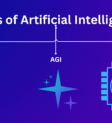The Dawn of Tomorrow: Game Changing AI Tools to Watch in 2025
The Dawn of Tomorrow: Game-Changing AI Tools to Watch in 2025
The relentless evolution of Artificial Intelligence continues to redefine industries and daily life at an astonishing pace. As we rapidly approach 2025, the technological landscape is poised for even more transformative shifts, driven by AI tools that promise to be truly game-changing. This post delves into the anticipated advancements, exploring how next-generation AI will push the boundaries of what’s possible, fundamentally reshaping how we work, create, and interact with technology.
Hyper-Personalization at Scale: AI as Your Digital Twin
By 2025, AI is set to elevate personalization to an unprecedented level, moving beyond simple recommendations to become a proactive, predictive partner in our digital lives.
Predictive Assistants and Proactive Solutions
Imagine AI systems that anticipate your needs before you even articulate them. This isn’t just about suggesting the next movie; it’s about AI proactively optimizing your schedule, managing your health, or even tailoring your learning path in real-time. Early research, as of late 2024, strongly indicates this shift towards proactive problem-solving. We’ll see AI-driven personal learning platforms, hyper-customized marketing campaigns that adapt instantly to user behavior, and preventative maintenance systems for smart devices that predict failures before they occur.
Ethical Considerations in Data Use
As personalization deepens, the ethical implications of vast data collection and privacy will become paramount. Future AI tools will need to incorporate robust privacy-preserving AI techniques and transparent data governance models to build and maintain user trust. [Internal Link: our guide to AI ethics]
Generative AI’s Next Evolution: Beyond Text and Images
Current generative AI models have already wowed us with their ability to create compelling text and stunning images. By 2025, expect these capabilities to expand exponentially.
Multi-Modal Creation and Synthetic Environments
The next frontier for generative AI is multi-modal creation. Leading AI researchers predicted in late 2024 that we’ll see sophisticated AI capable of generating entire interactive virtual environments, complex 3D models, and even functional code from natural language prompts. This will revolutionize sectors like gaming, architectural design, product prototyping, and software development, allowing creators to manifest complex ideas with unprecedented speed and fidelity.
AI-Assisted Scientific Discovery
AI tools will increasingly become indispensable partners in scientific research. By 2025, expect AI to accelerate discovery by generating novel hypotheses, designing intricate experiments, and analyzing colossal datasets in fields such as drug discovery, material science, and climate modeling. This will dramatically shorten research cycles and lead to breakthroughs that were previously unimaginable. [External Link: a recent report on AI in scientific research from Nature]
Autonomous AI: From Automation to Self-Sufficiency
The concept of automation will evolve significantly, moving towards truly autonomous AI systems that operate with minimal human intervention.
Self-Optimizing Business Operations
Beyond current Robotic Process Automation (RPA), AI systems will manage and optimize entire business processes autonomously. From intelligent supply chain logistics that dynamically adapt to real-time events to self-learning customer service agents that resolve complex issues, these systems will learn, adapt, and make informed decisions without constant human oversight. This shift will free up human capital for more strategic, creative, and empathetic tasks.
Enhanced Human-Robot Collaboration
Collaborative robots (cobots) will become more intuitive and adaptive. By 2025, we anticipate cobots learning from human interaction in real-time, understanding subtle cues, and seamlessly integrating into complex workflows in manufacturing, healthcare, and service industries. [External Link: an industry analysis on the future of robotics from the International Federation of Robotics]
The Rise of Explainable AI (XAI) and Trust
As AI becomes more deeply embedded in critical systems, understanding its decision-making process is no longer a luxury but a necessity. Significant advancements in Explainable AI (XAI) tools are ongoing as of late 2024. By 2025, these tools will provide transparent, interpretable insights into complex AI models, fostering greater trust, accountability, and enabling human operators to understand and audit AI’s rationale, particularly in high-stakes applications like finance, law, and medicine.
FAQs About Game-Changing AI Tools in 2025
- Q: Will these AI tools replace human jobs entirely?
A: While some routine tasks will undoubtedly be automated, the more likely scenario is a significant shift in job roles. AI tools will augment human capabilities, creating new jobs focused on AI development, oversight, ethical governance, and creative problem-solving that leverages AI as a powerful assistant. - Q: How can businesses prepare for these 2025 AI advancements?
A: Businesses should prioritize building robust data infrastructure, investing in upskilling their workforce in AI literacy, fostering a culture of innovation, and exploring pilot projects to strategically integrate AI into core operations rather than waiting for a complete overhaul. - Q: Are there any risks associated with these advanced AI tools?
A: Yes, potential risks include ethical dilemmas related to bias and fairness, data privacy concerns, the potential for misuse, and the critical need for robust security measures. Responsible AI development, strong regulatory frameworks, and continuous oversight will be paramount to mitigate these challenges. [Internal Link: our post on responsible AI development]
Conclusion
The AI landscape of 2025 promises a future where technology is not just smart, but truly intelligent, adaptive, and deeply integrated into our lives and work. From hyper-personalized experiences and multi-modal creative tools to autonomous systems and transparent, explainable AI, these advancements are set to redefine industries, empower individuals, and unlock unprecedented levels of innovation and efficiency. Embracing and strategically leveraging these game-changing AI tools will be key to navigating and thriving in the years to come.



